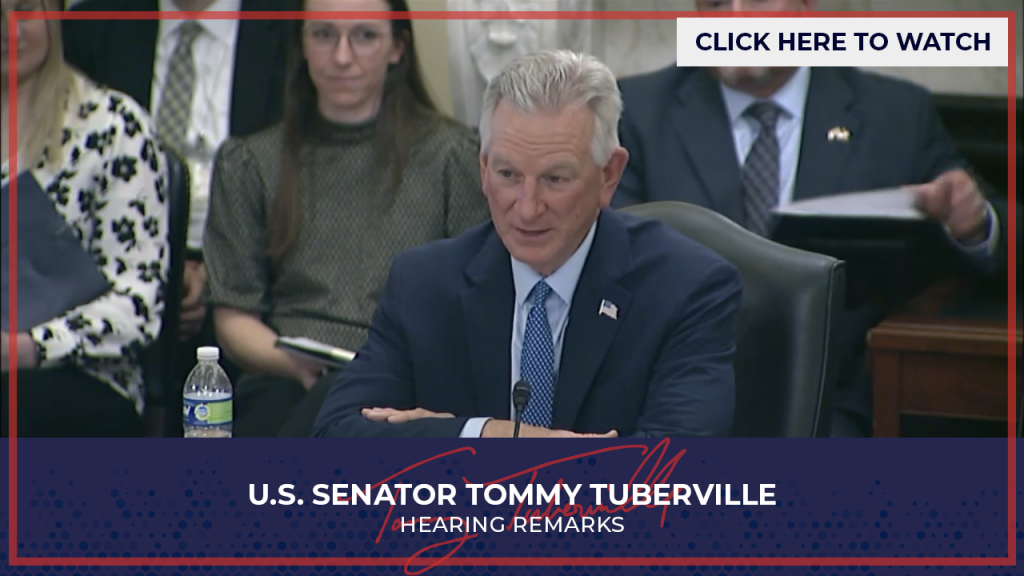WASHINGTON – As Chairman of the Senate Armed Services Subcommittee on Personnel, U.S. Senator Tommy Tuberville (R-AL) led a hearing on Department of Defense (DOD) policies and programs ahead of the Fiscal Year (FY) 2026 National Defense Authorization Act (NDAA). During the hearing, Sen. Tuberville spoke with the witnesses about heightening recruitment standards in order to get the strongest fighting force possible and staffing shortages across military hospitals and clinics.
Witnesses included:
- Lieutenant General Brian S. Eifler, Deputy Chief of Staff for Personnel for the United States Army
- Vice Admiral Richard J. Cheeseman, Jr., Chief of Naval Personnel for the United States Navy
- Lieutenant General Michael J. Borgschulte, Deputy Commandant for Manpower and Reserve Affairs for the United States Marine Corps
- Lieutenant General Caroline M. Miller, Deputy Chief of Staff for Manpower, Personnel, and Services for the United States Air Force
- And Ms. Katharine Kelley, Deputy Chief of Space Operations for Human Capital for the United States Space Force
Read excerpts of Sen. Tuberville’s remarks below and watch on YouTube or Rumble.

“Alright, the Senate Armed Services Subcommittee on Personnel meets this afternoon to provide an important opportunity for senior leaders at the Department of Defense to highlight areas where Congress can support and strengthen our military’s most valuable asset—its people. People are our most valuable asset. I think we should all know that. Those who volunteer to serve, in and out of uniform, are the backbone of our national defense, and this is a critical discussion as we prepare for the NDAA for Fiscal Year 2026.
I want to thank our witnesses for joining us today:
- Lieutenant General Brian S. Eifler, Deputy Chief of Staff for Personnel for the United States Army
- Vice Admiral Richard J. Cheeseman, Jr., Chief of Naval Personnel for the United States Navy
- Lieutenant General Michael J. Borgschulte, Deputy Commandant for Manpower and Reserve Affairs for the United States Marine Corps
- Lieutenant General Caroline M. Miller, Deputy Chief of Staff for Manpower, Personnel, and Services for the United States Air Force
- Ms. Katharine Kelley, Deputy Chief of Space Operations for Human Capital for the United States Space Force
I’m glad to see our military refocusing on warfighting and readiness after the previous administration prioritized DEI, abortion, and other progressive policy initiatives over lethality. [That is] one of the reasons we’re here today. This shift is already leading to a renewed enthusiasm for personnel for military service among the American people.
While I’m encouraged by the recent improvements in military recruitment, I’m increasingly concerned about the quality of the recruits we’re bringing in. Many of the services have lowered their standards to meet [recruitment] goals. The Army and Navy’s prep courses have seen some success, but that success only matters if they’re actually raising the academic and physical performance of our recruits. The caliber of the men and women we bring in directly affects readiness levels and the long-term strength and effectiveness of our military. So, I’d like the witnesses to address the effect that lowered enlistment standards could have on long-term attrition and readiness, and how you are ensuring you are not sacrificing quality for quantity.
I’d also like to address the health of the force in this hearing. Military hospitals and clinics are facing staffing shortages, leading to reduced access to care, which ultimately impacts the health and retention of service members and their families. This, combined with lower recruiting standards, means the force is more susceptible to health issues like obesity and mental health challenges. I’d like to hear what the Services are doing to ensure the health and readiness of their military personnel.
In recent years, this Subcommittee has invested heavily into the quality of life of service members, ensuring they and their families, have the resources and support necessary to thrive both in and out of uniform. This remains a priority. However, these investments will be undermined if we fail to address the quality of recruitment and health of the force. Sustaining a healthy and effective military goes beyond simply meeting the recruiting missions—it requires a commitment to the well-being and long-term readiness of every single service member.
Thank you to the witnesses for appearing today. I look forward to your testimony.”
Senator Tommy Tuberville represents Alabama in the United States Senate and is a member of the Senate Armed Services, Agriculture, Veterans’ Affairs, HELP and Aging Committees.
###